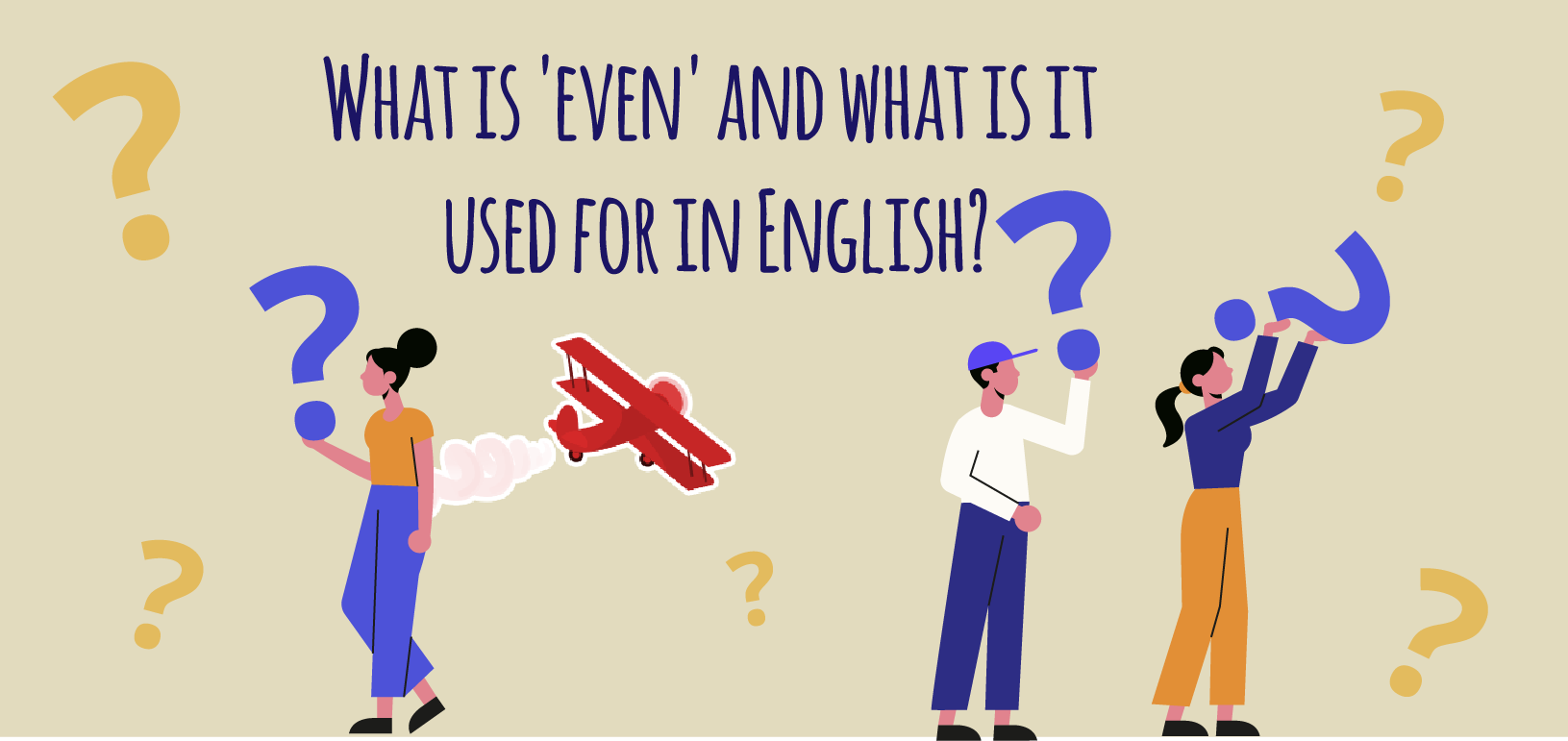What is ‘even’ and what is it used for in English?

Even
INDEX OF CONTENTS
- What does ‘even’ mean?
- More meanings
- Collocation with auxiliary verbs
- With other verbs ‘Even’ usually goes before the verb
- ‘Even’ can also be used in negative sentences
Maybe at first it will be something quite complicated. Many times the words in English (and also in Spanish) have several uses. It is a question that can cause confusion , if you only know one of the meanings. So today we are going to see how the word “even” is used in English.
In this article we explain everything concerning these words, as a word of multiple interpretations and therefore of various applications, hence the need to know how to handle it properly. Because logically, the solution is to know well the grammar rules to put them into practice.
What does ‘Even’ mean?
It has many meanings. As ADJECTIVE it can mean “even”, “tied”, “in equal parts” “exactly”. But in this post we will give a general review of the meaning beyond adjective. Because it has a meaning that can be expressed with several words in Spanish, depending on the phrase. It can mean “even”, in the sense of “extreme case”. This “even” can also be expressed with “until” “still” and “still” and much more …
For example, when used as an adverb in English , it expresses surprise and can be used to emphasize differences when making comparisons.
Examples:
- These photographs aren´t very good. Even I could take better photographs than these.
Estas fotografías no son muy buenas. Incluso yo podría tomar mejores fotografías que estas.
- He always wears a coat – even in hot weather
Siempre usa abrigo, incluso cuando hace calor
- Nobody would lend her the money – not even her best friend. Or Note ven her best friend would lend her the money.
Nadie le prestaría el dinero, ni siquiera su mejor amiga. O tenga en cuenta que su mejor amiga le prestaría el dinero
More meanings
- In negative, it can be translated as “not even”.
- EVEN SO means “however”
Examples of all these meanings:
- He was so angry with me that he EVEN called me ‘stupid’.
Él estaba tan enfadado conmigo que INCLUSO me llamó “estúpido”.
- We were so happy that we EVEN danced.
Estábamos tan contentos que HASTA bailamos.
- It is EVEN worse than it seems.
Es AÚN / TODAVÍA peor de lo que parece.
- I haven’t EVEN started.
NI SIQUIERA el empezado.
- They were very intelligent. EVEN SO, they couldn’t make it to Harvard.
Ellos eran muy inteligentes. Sin embargo, no lograron entrar en Harvard
Collocation with auxiliary verbs
When there is an auxiliary verb (have, do) and with the verb “to be”, it usually goes BEHIND the auxiliary verb.
Examples:
- They have bought many things since they got here, they have (v.aux) EVEN bought a car.
Han adquirido muchas cosas desde que llegaron aquí, han INCLUSO comprado un coche.
- She doesn’t (v. aux) EVEN know how to speak Spanish.
Ella NI SIQUIERA sabe hablar español.
- My dog is very friendly. He’s (v. “to be”) EVEN friendly to strangers.
Mi perro es muy amistoso. Es amistoso HASTA con los desconocidos.
With other verbs EVEN usually goes before the verb
Examples:
- I did so many things yesterday. I EVEN cleaned (otro verbo) my room.
Hice tantas cosas ayer. INCLUSO limpié mi habitación.
- He worked so hard, he EVEN finished writing his paper before the deadline.
Él trabajó tan duro que INCLUSO terminó de escribir su trabajo antes de plazo.
It goes to the beginning of the sentence in two cases :
- When it comes to the subject
- When you want to emphasize something
Example of when it refers to the subject:
- That is so easy to do. EVEN I (sujeto) can do it.
Esto es tan fácil de hacer. INCLUSO yo lo puedo hacer.
Example of when you want to emphasize some words:
- He is always working. EVEN on weekends (emphasis).
Él siempre está trabajando. INCLUSO los fines de semana.
It can also be used in negative sentences.
In this case, as we have seen above, it translates as “NOT EVEN”
- He’s so lazy he doesn’t EVEN unbutton his shirt to take it off.
Es tan vago que NI SIQUIERA se desabrocha la camisa para quitársela.
It can go with “if”. In this case it is translated as “Even if”
Example:
- Even if you tell him not to do it, he’ll do it.
Incluso si le dices que no lo haga, lo hará.
Even Though means “Although”.
Example:
- Even though I told him not to do it, he did it.
Aunque le dije que no lo hiciese, lo hizo.


